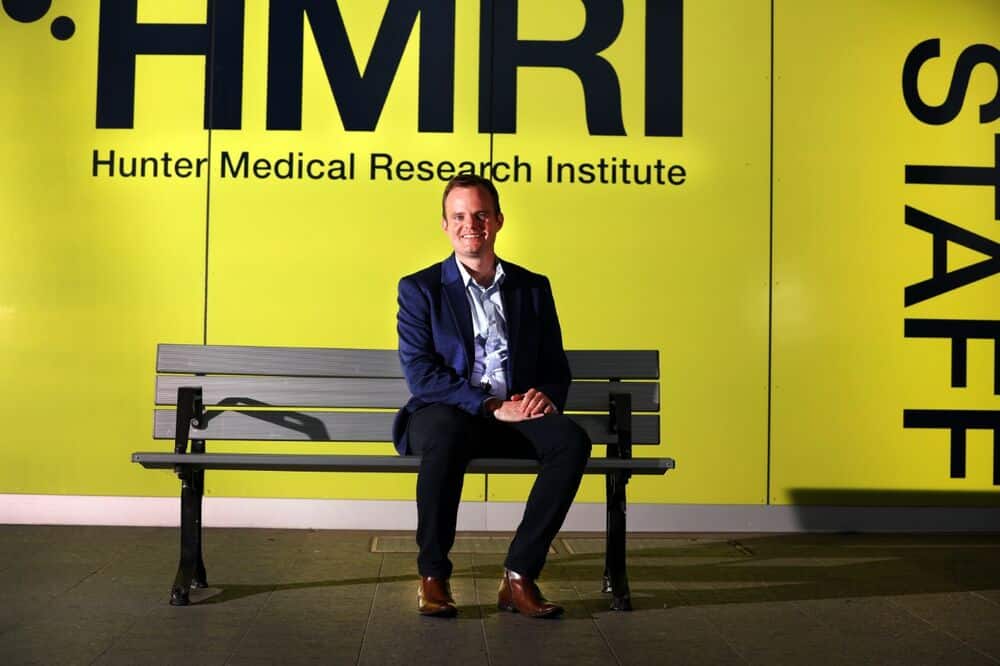
Associate Professor Luke Wolfenden, Career Development Fellow at the University of Newcastle, Program Manager at Hunter New England Population Health and HMRI-affiliated researcher, has received a funding grant from nib to deliver their ‘Fast Facts’ project – arming health officials more quickly and effectively with up-to-date evidence to better inform the public health response to the COVID-19 pandemic.

Associate Professor Luke Wolfenden, Career Development Fellow at the University of Newcastle, Program Manager at Hunter New England Population Health and HMRI-affiliated researcher, has received a funding grant from nib to deliver their ‘Fast Facts’ project – arming health officials more quickly and effectively with up-to-date evidence to better inform the public health response to the COVID-19 pandemic.
Working with the HNE COVID-19 Public Health response team, Associate Professor Wolfenden will collaborate with international communicable disease expert and Hunter New England Health public health physician, Associate Professor Craig Dalton, to address COVID-19 health questions utilising the latest global health evidence.
The team will work closely with Cochrane Australia and Cochrane International, the largest producer of systematic reviews internationally to access a living register of COVID-19 studies.
Associate Professor Wolfenden is the international co-lead of the Cochrane ‘Public Health’ review group, and notes that this project allows the team to access the infrastructure of Cochrane, which includes its living register of COVID-19 studies, bank of research questions and access to experts.
“This funding from nib will enable us to establish a research team that can take the best Australian and International evidence and apply it locally, nationally and globally,” Associate Professor Wolfenden says.
The COVID-19 global health emergency provides new challenges to our communities, and utilising the latest studies to inform best practice across the Hunter New England region – and beyond will deliver the best outcomes for our communities.
“Given the novelty of the virus, early responses to the disease outbreak were based on similar viruses such as SARS (severe acute respiratory syndrome) and MERS (Middle East Respiratory Syndrome),” explains Associate Professor Wolfenden. “However, while COVID-19 is related to these viruses, it is genetically, epidemiologically and clinically distinct.”
One of the questions this project may address is: What is the incubation period and how does this impact quarantine? To date, a number of small studies have been done, so if their data is pooled, it can provide a far more precise and reliable estimate of the incubation period.
HMRI Institute Director Professor Tom Walley emphasised the importance of a cohesive approach to applying evidence-based research in times of a global health crisis. “COVID-19 has affected communities across the world, so it’s vital that we have the ability to rapidly assess all the available evidence when it comes to translating research into effective health policy and practice.”
“This is a time when we need evidence and research, rather than opinion, to inform our actions,” Professor Walley says. “This work will make the best evidence available quickly to enable clinicians and policy makers to use it for patient benefit.”
Other important issues this project will examine include assessing the risk of infection and transmission among healthcare workers, and identifying the frequency and virus attach rates in schools.
nib Group Chief Medical Officer, Dr Mellissa Naidoo, said the $126,000 research partnership is important given there is still no vaccine or treatment for COVID-19.
“It’s vital that clinicians can access the most up to date research and evidence to inform patient care and community health,” Dr Naidoo said.
“We’re proud to partner with HMRI, in delivering the Fast Facts project, to enable best practice in clinical decision-making and the public health response to COVID. Until a vaccine is available, this project helps put the best evidence available at the fingertips of those looking after the short and long-term health of our community,” she added.
“We already have the expertise at a local level so we can move quickly to start work on the project,” Associate Professor Wolfenden says. “We’ll be working together over the next 6 – 8 months to ensure that the COVID-19 response is produced rapidly to a scientifically rigourous standard.”
HMRI would like to acknowledge the Traditional Custodians of the land on which we work and live, the Awabakal and Worimi peoples, and pay our respects to Elders past and present. We recognise and respect their cultural heritage and beliefs and their continued connection to their land.

Hunter Medical Research Institute
We’re taking healthy further.
Locked Bag 1000
New Lambton
NSW, Australia, 2305



This site is protected by reCAPTCHA and the Google Privacy Policy and Terms of Service apply.
Copyright © 2024 Hunter Medical Research Institute | ABN: 27 081 436 919
Site by Marlin Communications
